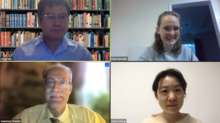- January 5, 2022
A team of #MasonCHHS researchers designed an app to combat the growing mental health concerns affecting undergraduate students due to the COVID-19 pandemic. The researchers created a predictive health app that detects when undergraduate students are exhibiting behavioral, emotional, and academic concerns and connects the students to appropriate resources, such as Mason's Counseling and Psychological Services.
- December 15, 2021
Research Manager Tammie M. Jones and Chair of the Health Administration and Policy Department P.J. Maddox published a new study about the relationship between Community Health Worker (CHW) state regulations and the adoption of standard roles, skills, and qualities. States with CHW certification programs were found to have a higher number of employers who adopt occupational standards.
- August 18, 2021
Thanks to the generosity of Michael von Fricken, professor of Global and Community Health, the One Health Scholarship will provide a selected graduate student with funding and/or support to pursue a research project relating to the One Health initiative.
- July 7, 2021
George Mason University’s Dr. Michelle Williams shares program evaluation results determining the feasibility of offering free, same-day cancer screening and health education to reduce disparities. The program examined how access to free screenings affects participants’ knowledge about cancer, self-efficacy for obtaining healthcare, and intentions to change health behaviors. The program had a positive effect on participant’s knowledge of cancer screenings and self-efficacy for seeking regular check-ups.
- July 7, 2021
New research examines commuter characteristics to better understand how factors such as departure time, frequency, and commute length are associated with exposure to air pollution. Using personal air pollution monitors, the research clustered commuters to determine whether these clusters were associated with traffic pollution exposures. The study reveals that commuters that travel during rush hour have higher overall exposure to traffic-related air pollution compared to sporadic commuters, though the difference was not statistically significant.
How do environmental factors such as the COVID-19 pandemic, air pollution, chemical exposures, social, genetic, and neighborhood exposures influence obesity and asthma rates? The College is exploring this question as it collaborates in the ECHO program, a seven-year initiative funded by the National Institutes of Health.
Supersized alcopops are ready-to-drink flavored alcoholic beverages that have up to five times the alcohol content of beer and appear to be marketed toward young drinkers. A new George Mason University study led by Dr. Matthew Rossheim found that calls to U.S. poison control centers for supersized alcopops disproportionately involved underage drinkers compared to calls for other alcohol products. Better regulation of their alcohol content and retail availability is urgently needed to protect youth.
A new George Mason University College of Health and Human Services study is one of first individual-level studies to track movements and symptoms during the COVID-19 pandemic. Dr. Janusz Wojtusiak led the study—one of the first individual-level studies to track movements and symptoms during the COVID-19 pandemic.
New research led by George Mason University’s College of Health and Human Services faculty Dr. Michelle Williams assessed African American breast cancer survivors’ risk factors and knowledge about cardiovascular disease in the Deep South. They found that although African American breast cancer survivors have a higher prevalence of CVD risk factors, their knowledge about CVD is low.
COVIDsmart, a digital health study designed to examine the many impacts of COVID- 19 on individuals and their communities launched today, with an open call for participation. The study welcomes participants from all walks of life across Virginia to share information on how the pandemic has affected their lives, even if they have not had COVID-19.





